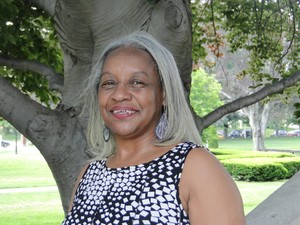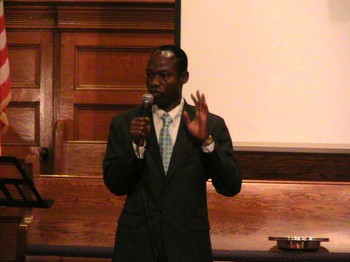When Quianaca Wesseh called his son, mother, and sister in Liberia’s Maryland County last week, he urged them not to go to the hospital.
"I don’t know if it was the wrong thing to say, but a lot of people are going to the hospital and never returning,” said Wesseh, a Liberian native who serves as director of praise music at Curby Memorial Presbyterian Church in St. Louis. “In Liberia, our hospitals are not advanced like in America. There are no isolation gowns, no protective equipment.”
Wesseh is one of some 25 Liberian immigrants who joined the Curby church — a small congregation which averages 20-25 in worship — when their former church home, Carondelet-Markham Memorial Presbyterian Church also in St. Louis, closed a few years ago.
Under the leadership of Curby’s new pastor, the Rev. Paula Cooper, and David Zweh, a commissioned ruling elder and a native of Liberia, Curby is growing into its increasingly multicultural identity while providing a home, a voice, and — most critically — ongoing pastoral care for its Liberian members as the Ebola virus continues to spread across the African continent, generating tremendous anxiety for those with relatives living where the death toll is at its highest.
“We have special prayers in worship for the people of Africa and Liberia,” Wesseh said. “The leadership of Curby and the Liberian community visits our Liberian members. They visit me and try to encourage me. We had a meeting last Sunday about Ebola with the wider Liberian community in St. Louis to try to raise funds, but the most important thing we’re doing right now is praying with the families.”
Even before Cooper arrived six months ago — prior to the current Ebola outbreak — with the goal of revitalizing Curby through the Presbyterian Mission Agency’s Small Church Residency Program, she was committed to modeling for church members a new way to respect and celebrate each other’s differences.
“I thought it would be wise to share leadership with David [Zweh] to show a form of harmony and unity between us,” Cooper said, “hoping that would influence the Liberian members as well as our Caucasian and African-American members to see that if the leadership is working together, we all need to work together.”
Zweh — who has been called upon in recent weeks to share situational updates with the congregation — is especially concerned about how little is actually known about how to prevent, contain, and treat the Ebola virus, as well as the consequences that result from the misinformation circulating among the Liberian people.
“Some people are trying to take advantage of the people in the villages by telling them that there’s something they can put in the water to eliminate Ebola,” Zweh said. “They’re taking advantage of innocent people in Liberia. This is why I am telling our members to call their people by phone and tell them what we know about staying safe. If we call our relatives, they will believe what we say rather than what others are telling them.”

The Rev. Paula Cooper —PNS file photo
Cooper said that she plans to talk with the church’s session — which has already taken an active role with the Presbytery of Giddings-Lovejoy in addressing the recent events in Ferguson, Missouri — about additional ways the church can strengthen and support the congregation’s Liberian members, while responding to the Ebola crisis more broadly through gifts to the Presbyterian Mission Agency.
Self-Development of People (SDOP), the Presbyterian Hunger Program (PHP), and Presbyterian Disaster Assistance (PDA) — along with other ecumenical partners — have been involved in communities in Liberia and Sierra Leone through the West Africa Initiative (WAI) since 2007.
“We are deeply saddened to hear from our colleagues just how horrendous the situation is in both countries,” said Cynthia White, coordinator for SDOP. “We will be praying especially for Sierra Leone from September 18-21 as the country will be in a nationwide ‘lock-down’ as authorities do intensive information sharing and door-to-door visits searching for suspected or probable Ebola infected persons. We know WAI will continue to assist the economically poor and oppressed in both countries. We also know that this crisis might change our working style and possibly our focus. Our friends and colleagues are constantly in our prayers.”
Further complicating the crisis are the recently implemented travel restrictions that — while put into place to contain the spread of Ebola — have also severely limited the Liberian people’s access to food. “People have the money but there is no food to buy because they aren’t allowed to travel,” Wesseh said. “They are starving where they are because they can’t go anywhere.”
“The restrictions on movement between urban and rural-farming areas and the quarantine imposed on some countries have also caused food production to be seriously impacted,” said the Rev. Laurie Kraus, coordinator for PDA, “making critical shortages of food a reality in the near future.”
The Rev. Sam Atiemo, associate for African Emerging Ministries in Racial Ethnic & Women’s Ministries/Presbyterian Women — whose role includes working in partnership with mid councils to ignite the movement to grow new African worshiping communities and providing leadership development to African emerging leaders — said that he applauds the efforts of the PHP to “get down to the grass roots” and deliver food to the poorest of the poor.
Valery Nodem, associate for International Hunger Concerns in the PHP, said that working with communities in Liberia and Sierra Leone and being able to plant seeds of hope through the West Africa Initiative has been very rewarding.
“It is very sad to see the poverty cycle at work — civil war, reconstruction and hope — and then the Ebola outbreak, which in a lot of places will mean starting over,” said Nodem. “It is frustrating, but in the midst of this it is also comforting to know that in the last seven years communities involved with WAI in both countries acquired something that even Ebola cannot take away — pride, skills, and confidence that they can rebuild their lives.”
At the same time, Cooper is also helping the Liberian community in St. Louis to acquire life skills and confidence to live full and productive lives. “Even though English is the first language of Liberia, many who have come here and have become citizens have become so accustomed to using their tribal language that they don’t use the English language enough and have no ongoing opportunities to practice,” Cooper said.
“For that reason, Curby is now developing an ESL literacy program for our Liberian members,” she added. “The program has already generated interest beyond the Liberian members to a couple of the American members of the church, both black and white, who said to me, ‘You know, I don’t read that well either.’ The program will begin in-house but if it’s successful, we will open it up to other Liberians and in the wider community wherever the need may be.”
Amidst all of the ongoing efforts to educate, equip, and provide for those affected by the Ebola crisis — both here and in West Africa — prayer remains central.
“Pray for our government and hope that all governments and agencies will work together to provide treatment for our people,” said Zweh.
PDA shares Zweh’s commitment to — and prayers for — effective partnerships.
“This struggling area of Africa, still recovering from the aftermath of war and seeking a stable future,” Kraus said, “needs the attention and help of Presbyterians and the world community to help them sustain a hopeful future in the face of these serious, life and community threatening challenges."

